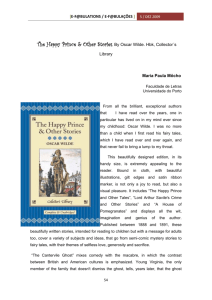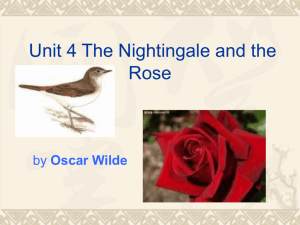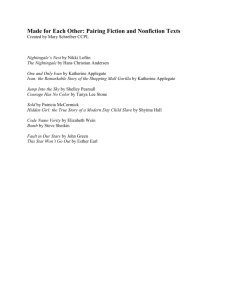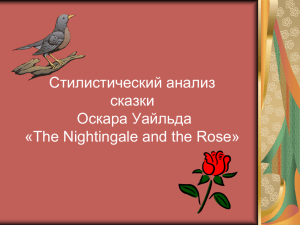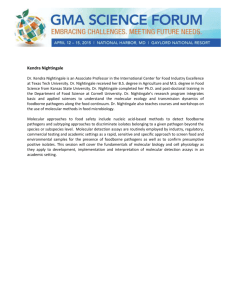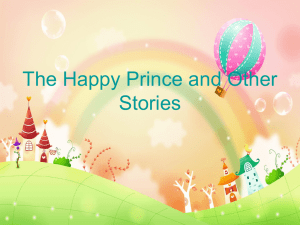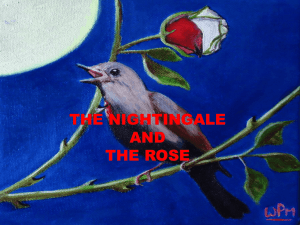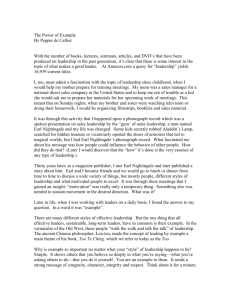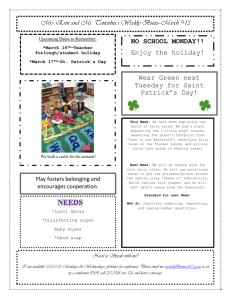What Is Love???
advertisement
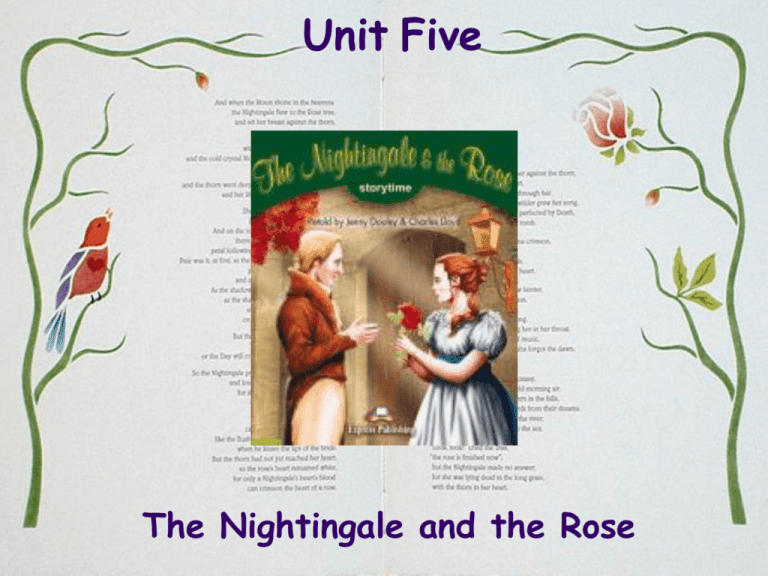
Unit Five The Nightingale and the Rose Unit Five The Nightingale and the Rose Period 1-2 Arrangements (Period 1-2) •Assignment checking •Lead-in and warm-up activity •Summary & Problems solving •Assignment Assignment checking 1. 2. 3. 4. 5. 6. Preview unit three (answer the following questions) What’s true love in your opinion? Tell some stories about true love . If you really love a person, will you sacrifice your life for love? In your mind, can money and power buy true love? Why? Is love really more precious than precious stones? Is love basically a commodity in the market like any other goods? Is love silly and unpractical? What is love What is love What is love Is this a true love? Topic Discussion: What Is Love??? Love is appearing in the various aspects in our daily life. e.g. parents’ love to the children, the love between the lovers, between the colleagues, the doctor’s love to the patients, God’s benevolence towards mankind, etc. Love is the most important part to the human being. The true love is that you care about someone, he/she cares about you at the same time! Love is something you can devote your life to. →Love is better than life. ( the Nightingale believed) →Sacrifice I. Listen to A Song: The Rose Some say love It is a river That drowns the tender reed Some say love It is a razor That leaves your soul to bleed Some say love It is a hunger an endless aching need I say love It is a flower And you it's only seed It's the heart afraid of breaking That never learns to dance It's the dream afraid of waking That never takes the chance It's the one who won't be taken Who can not seem to give And the soul afraid of dying That never learns to live When the night has been too lonely And the road has been too long And you think That love is only for the lucky and the strong Just remember in the winter Far beneath the bitter snow Lies the seed That with the sun's love In the spring becomes the rose II. Love Mottos I love you not because of who you are, but because of who I am when I am with you. No man or woman is worth your tears, and the one who is, won‘t make you cry. Never frown, even when you are sad, because you never know who is falling in love with your smile. To the world you may be one person, but to one person you may be the world. Don‘t waste your time on a man/woman, who isn‘t willing to waste their time on you. Maybe God wants us to meet a few wrong people before meeting the right one, so that when we finally meet the person, we will know how to be grateful. III. Take a Love Quiz 1. You are walking to your love's house. There are two roads to get there. One is a straight path which takes you there quickly, but is very plain and boring. The other is curvy & full of wonderful sights on the way, but takes quite a while to reach your love's house. WHICH PATH DO YOU CHOOSE? Short or Long? Take a Love Quiz 2. On the way, you see two rose bushes. One is full of white roses; the other is full of red roses. You decide to pick twenty roses for your love. (You could pick all of the same color or half & half or whatever combination that suits your taste.) WHAT COLOR COMBO DO YOU CHOOSE? Take a Love Quiz 3. You finally get to your love's house. You ring the bell and a family member answers the door. You can ask the family member to get your love, or you may get him/her yourself. WHAT DO YOU DO? Ask or Get Yourself? Take a Love Quiz 4. Now, You go up to your love's room. No one is there. You could leave the roses by the windowsill or on the bed. WHERE DO YOU PUT THE ROSES? Window or Bed? Take a Love Quiz 5. Later it's time for bed. You and your love go to sleep in separate rooms (we're very politically correct, here). You wake up in the morning and go to your love's room to check up on him/her. You enter the room: IS HE/SHE AWAKE OR SLEEPING? Take a Love Quiz 6. It's time to go home now and you start to head back. You can take either road home now. The plain and boring one that gets you home faster or the curvy and sight-filled road that you can just take your time with. WHICH ROAD DO YOU CHOOSE? Short or Long? About the Author –Oscar Wilde(1854-1900) •He is a famous English writer, dramatist and poet. •He is the founder of one of the chief advocates of "art for art's sake“. •He is the son of the late Sir William Wilde, an eminent Irish surgeon. •His mother was a graceful writer, both in prose and verse. In1874-1878, He had a brilliant career at Oxford, where he won the Prize for English verse for a poem. Even before he left the University in 1878 Wilde had become known as one of the most affected of the professors of the aesthetic craze, and for several years it was as the typical aesthete that he kept himself before the notice of the public. Criticism: All these pieces had the same qualities--a paradoxical humor and a perverted outlook on life being the most prominent. They were packed with witty sayings, and the author’s cleverness gave him at once a position in the dramatic world. Oscar Wilde’s Works Novel: The Picture of Dorian Gray 《道林·格雷的画像》1891 Tales: The Happy Prince And Other Tales 1888 A House Of Pomegranates 1891 《石榴屋》 Poems: Poems,1881 Sphinx,1894 The Ballad of Reading Gaol,1898 Plays: Lady Windermere's Fan 1892. An Ideal Husband 1895 A Woman of No Importance 1893. The Importance of Being Earnest 1895 Oscar Wilde’s Belief Art for art’s sake The only purpose of the artist is art, not religion, or science, or interest. He who paints or writes only for financial return or to propagandize political and economic interests can only arouse feeling of disgust. Quotes Quotes on Men Men become old, but they never become good. --Lady Windermere's Fan. Rich bachelors should be heavily taxed. It is not fair that some men should be happier than others. --In Conversation. Men are horribly tedious when they are good husbands, and abominably conceited when they are not. --A Woman of No Importance. Lady Windermere: ...I don't like compliments, and I don't see why a man should think he is pleasing a woman enormously when he says to her awhile heap of things that he doesn't mean. --Lady Windermere's Fan. Quotes Quotes on Women One should never trust a woman who tells one her real age. A woman who would tell one that, would tell one anything. --A Woman of No Importance. Crying is the refuge of plain women but the ruin of pretty ones. --Lady Windermere's Fan. Women know life too late. That is the difference between men and women. --A Woman of No Importance. Women are meant to be loved, not to be understood. --The Sphinx Without a Secret. Quotes Quotes on Love One should always be in love. That is the reason one should never marry. --In Conversation. To love oneself is the beginning of a life-long romance. --Phrases and Philosophies for the Use of the Young. A man can be happy with any woman as long as he does not love her. --The Picture of Dorian Gray. Young men want to be faithful and are not; old men want to be faithless and cannot. --The Picture of Dorian Gray. Quotes Humorous Words Always forgive your enemies; nothing annoys them so much. Fashion is a form of ugliness so intolerable that we have to alter it every six months. I am not young enough to know everything. I think that God in creating Man somewhat overestimated his ability. I can resist everything except temptation. Summary & Problems solving Assignment 1. Review: Go over the background information in Unit 5. 2. Preview: (1)Read through text A, pick out and learn the language points. (2)Study the new words in Unit 5. (3)Do preview exercise 1 on page 107. (4)Give the subsection of text A. 3. Written exercises: (1)Do exercise 2 on page 108, speaking exercise 1 on page 110, exercise 1 on page 111,exercise 4 on page 113,exercise 6 on page 114. (2) Translate a poem Annabel Lee. Unit Five The Nightingale and the Rose Period 3-4 Arrangements (Period 3-4) •Assignment checking •Text analysis •Summary & Problems solving •Assignment Assignment checking: 1. Review: Some questions about he background information and the key words. 2. Written exercises: Exercise 1 on page 111,exercise 4 on page 113,exercise 6 on page 114. 3. Preview: (1) Preview exercise 1 on page 107. (4) The structure of text A. Text Analysis Structure Part 1 (Paras. 1-12 ): Nightingale struck by “the mystery of love” Part 2 (Paras. 13-33): Nightingale looking for a red rose to facilitate the love Part 3 (Paras. 34-44): Nightingale sacrificing her life for a red rose Part 4 (Paras. 45-53 ): Student discarding the red rose Warming up Text Analysis--Questions/Activities • Did you enjoy fairy tales as a child? Why or why not? •Can you name some of the fairy tales that you have read? •Who are the most famous fairy tales collectors and writers? Warming up Questions / Activities W B T R Warming up Questions / Activities The prince asked who she was and how she came there. She looked at him tenderly and with a sad expression in her dark blue eyes, but could not speak. Warming up Questions / Activities “Oh, very badly indeed!” she replied. “I have scarcely closed my eyes the whole night through. I do not know what was in my bed, but I had something hard under me, and am all over black and blue. It has hurt me so much!” Warming up Questions/Activities But the emperor isn't wearing any clothes! Warming up Questions/Activities Yes Beast, I will marry you. Warming up Questions/Activities “She said that she would dance with me if I brought her red roses,” cried the young Student, “but in all my garden there is no red rose.” Hans Christian Andersen The Little Mermaid 小美人鱼 The Emperor’s New Clothes The Ugly Duckling The Princess and The Pea 豌豆公主 Grimm Brothers Cinderella Sleeping Beauty The Frog King The Fisherman & His Wife Snow White Little Red-Cap Text Analysis--Discussion What characteristics of fairy tales did you find? What style can this story be categorized into? What are the characteristics of the story? What’s the difference between Wilde’s fairy tales and other’s? The characteristics of the above fairy tales 1. Witches and Queens 2. Giants and elves (精灵) 3. Princes and princesses 4. Talking animals 5. Marvelous and magical things happen: a) a boy may become a frog b) a princess may sleep for a hundred years 6. Always same ending and similar theme: truth prevails over deception generosity is ultimately rewarded hard work overcomes obstacles love, mercy and kindness are the greatest powers of all Style of this story and its characteristics Fairy tales - contain supernatural or magical elements - children’s stories - full of veiled comments on life Characteristics: a) personification of birds, insects, animals and trees b) vivid, simple narration --- typical of the oral tradition of fairy tales c) repetitive pattern What’s the difference between Wilde’s fairy tales and other’s? Other's Optimism Fairy tales conclude with the same topic. ‘They all lived happily ever after,’ implying better living circumstances for all. Wilde's Pessimism •Wilde’s fairy tales have no happy endings. Even in his most popular tales, the protagonists die. •His tales end mostly in unresolved tensions, provoking readers to consider necessary improvements which need to be made within the social order. Fairy Tales’ Performance Choose one of them to make a performance: Cinderella Snow White and the Seven Dwarfs The Emperor's New Clothes The Frog King Thumbelina Aladdin Beauty and the Beast … Criterion Best Leading Actor Best Supporting Actor Best Director Stage & Sound Design Costume & Make-up (服装) 20% Plot and Imagination (剧情创意)20% Pronunciation & fluency (语音,流利度)30% Stage Performance (舞台表现)30% Legend of the White Snake Lady & The Legend of Lady White Journey To the West Summary & Problems solving --A Poem: Annabel Lee Assignment 1. Review: Go over the topic discussion. 2. Preview: (1)Preview the content in the unit and pick out the key language points. (2) Do exercise 2 on page 108. 3. Written exercises: Do exercise 2、3 on page 112, exercise1、 2 on page 116, exercise 3 on page 117. Unit Five The Nightingale and the Rose Period 5-6 Arrangements (Period 5-6) •Assignment checking •Text analysis •Summary & Problems solving •Assignment Assignment checking: 1. Review: Some questions about the topic discussion. 2. Written exercises: Exercise 2、3 on page 112, exercise1、 2 on page 116, exercise 3 on page 117. 3. Preview: Some questions about the text and language points. that he decided to devoted his whole life to teaching in his home village after he finished school/graduation. that he soon lost his power/was overthrown. that people generally agree that few major issues/big problems can be resolved without China’s participation. with a gun in his hand. with a page boy standing on either side of him and a few elderly soldiers sweeping the ground outside the city gate. with the roaring river in front and the enemy soldiers following closely. to keep calm To be a professor means To know a lot of names, persons and events in the past does not mean The doctors did all they could everything he says anything they ask for/demand all he get from a week of hard work All/Everyhing that is written in his wife’s letter nothing the doctor said anything you suggest Something he read in a popular magazine All that can be done has been done Anything the artist painted something that never existed before nothing the doctors could do Text Analysis Theme A young student seemed to be madly in love. He felt wretched because he couldn’t find a Red Rose for his love. The nightingale was so moved by this student’s love that she was determined to help him. But the only way to get a Red Rose in the cold winter was for the nightingale to build it out of her music and to stain it with her heart’s blood. That was what she did. Thus she sacrificed her life for the student. Detailed Study to the text Introductory questions: Q1: What does the student want? Why is it so important for him? Q2: Why does the nightingale feel so interested and go to great lengths to help him? Q3: Why is a red rose so difficult to get? Please find the exact sentence indicating the answer from the text . Q4: How can the nightingale get a red rose? Q5: How many songs does the Nightingale sing to bulid the rose ? Q6: What happens to the Nightingale? Q7: Does the girl appreciate it? Why? Q8: Does the Student treasure it? What does he do later? Three Songs: Change of love grow old and died crimson, opened thorn touch the heart love of man and maid pink Press closer but not touch the heart love of boy and girl blossomed but white breast against thorn Discussion & Presentation What are the symbolic meanings of “Student”, “Red rose”, “Lizard”, and “Nightingale”? Is Nightingale's death worthwhile? Why or why not? Is the story a tragedy? Why or why not? What are the symbolic meanings of “student”, “Red rose”, “Lizard”, and “Nightingale”? Student --- not a true lover, ignorant of love, not persistent in pursuing love Red rose --- true love, which needs constant nourishment of passions of the lovers. Lizard --- cynic (cynical people), a person who sees little or no good in anything and who has no belief in human progress; person who shows this by sneering and being contemptuous. Nightingale --- a truthful, devoted pursuer of love, who dares to sacrifice her own precious life Reinforcement Interpretation • On Nightingale’s Sacrifice: It is worthwhile, because: – Love in her heart deserves what it costs. – She died for her own belief. – It’s Nightingale’s love for “LOVE” itself that impulses her to make such great sacrifice. “Love for Love’s Sake” It is not worthwhile, because: – She found true love but couldn’t protect and promote it. – Her sacrifice went unknown and wasted. Reinforcement Interpretation • On love: It is because of this sacrifice that love is worth to be preserved and cherished. Real love could only be interacted with people who understood it. True love doesn’t need to be answered back. The fact that I love you has nothing to do with you. Reinforcement Interpretation On Whether this is a Tragedy: Yes, it is a tragedy, because: It is a tragedy from all perspectives, both the nightingale and the boy. Tearing up the purist and the loveliest stuff just in front of the readers endows the story with the power of tragedy. A strong contrast between the pure love and the cruel reality. Wilde’s comments in a letter to one of his friends (May 1888): The nightingale is the true lover, if there is one. She, at least, is Romance, and the student and the girl are, like most of us, unworthy of Romance. So, at least, it seems to me, but I like to fancy that there may be many meanings in the tale, for in writing it I did not start with an idea and clothe it in form, but began with a form and strove to make it beautiful enough to have many secrets and many answers. 1. “ Ah, I have read all that the wise men have written…my life is made wretched.” for want of: for the lack of e.g. For want of a better word, let’s call it Me-firstism. ( As I can’t think of a better word, Let’s call it Me-firstism.) For want of something better to do she decided to try gardening. ( As she could not find anything more interesting to do, she decided to try gardening.) want: e.g. The plants died for/from want of water. 1)the condition or quality of lacking something usual or necessary for /from want of 由于缺少 e.g. to live in want = to live in poverty 2) pressing need; 贫困 e.g. Are you in want of money? 3) something desired: in want of = in need of 2. “Here at last is a true lover,” said the Nightingale. “ Night after night have I sung of him, and now I see him.” (the inverted order) sing of him: to sing about him 3. “ The Prince gives a ball tomorrow night,…and my love will be there.” my love: my sweetheart. love: used as a term of endearment as in: e.g. My love is like a red, red rose, Newly sprung in spring. (1759-1796) 友谊地久天长 ---Robert Burns罗伯特伯恩斯 “Auld Lang Syne”=“Old Long Ago” Listen to A Song: Auld Lang Syne *Should auld acquaintance be forgot And never brought to mind? Should auld acquaintance be forgot And days of Auld Lang Syne. For Auld Lang Syne, my friends, For Auld Lang Syne, We'll take a cup of kindness yet For Auld Lang Syne.* For Auld Lang Syne, my friends, For Auld Lang Syne, We'll take a cup of kindness yet For Auld Lang Syne. 4. Emeralds and opals jewels (gems): emeralds(绿宝石) , ruby(红宝石), sapphire(蓝宝石), jade(翡翠)diamond plants: daisy(雏菊), rose, oak-tree( 橡树)daffodil 水仙花) animals: nightingale, lizard(蜥蜴), butterfly subjects: philosophy, metaphysics(形而 上学), logic stringed instruments: harp, violin, guitar, cello,Guzheng 5. dance to the sound of the harp: dance according to the sound of the harp, e.g. The snake would then dance to the music. The soldiers marched through the square to the drumbeat. 6. for: When used as a conjunction, it means “because”, but it is now considered quite formal, and it is not as strong as “ because”, therefore in adverbial clauses of reason, “ because” is always used. flung himself down on the grass: threw himself down on the grass 7….fluttering about flying by a quick, light flapping of the wings 8….and the little Lizard, who was something of a cynic, laughed outright. sth. of a cynic: a cynic without fully deserving the name, e.g. He is sth of an economist among us because his grandfather used to own a little store. cynic: a cynical person; a person who believes that everybody is motivated by selfishness laughed outright: laughed out loud; burst out laughing 9. Sat silent: “silent” here is again part of the complex subject. in the Oak-tree: Notice the use of “in” instead of “on” here. The use of “in” suggests that it is a large tree for a little bird like the Nightingale. Language Points: 1. flight: n. of “to fly”. It can also be used as the n. “flee”. soar: to fly upward quickly 2. grass-plot plot: a small piece of ground used for a special purpose 3. and= as a result of this e.g. One step forward, and he would fall down the cliff. Come late again, and you are fired. sweet could refer to taste, smell, or sound. e.g. sweet air, song, music, wine, flowers, cake, smile. 4. mermaiden (also mermaid): a fabled creature of the sea with the head and upper body of a woman and tail of a fish blooms in the meadow: bears flowers in the meadow 5. fan= metaphorical use, refers to anything resembling a fan. e.g. the mouth of a river; the foot of the page; the northern face of the mountain; the limbs of a tree; the eye of a needle; an arm of the sea; the tail of a comet; the teeth of a saw 6. chill: to freeze; to numb; to lower the temperature chilly (adj.): cold nip the buds: to stop the growth of the buds nip it in the bud: to prevent sth. form becoming a problem by stopping it as soon as it starts, e.g. Their policy was to throw the first person who dared to protest openly into prison so as to nip it in the bud. and= also, in addition to (first two) as a result (the last) 7. out of music: using music as the material, e.g. This chair is made out of hardwood. stain: to color; to dye; to tarnish 8. “…what is the heart of a bird compared to the heart of a man?” --rhetorical question—a question in form, not a statement in meaning. = The heart of a bird is nothing compared to the heart of a man. In other words, for the Nightingale, the Student’s love is much more important than her life. 9….swept over the garden… …moved quickly over the garden… e.g. A new broom always sweeps the room clean. A terrible storm swept across the whole city. The general’s eyes swept over the soldiers and gave the order to attack. 10. all= apart from style, there is nothing else e.g. Don’t listen to him. It’s all stuff and nonsense. He was all hot air. A lot of beautiful words, but completely meaningless. 11. After a time= after some time, after a moment Language Points: 1. spray= a small branch bearing buds, flowers or berries 2. A delicate flush of pink When used to refer to color, “delicate”= soft, subdued, or faint 3. A pang: a sudden sharp pain shoot through: to pass through swiftly 4….the Love that is perfected by Death, of the Love that dies not in the tomb. …the love that grows and grows until they die, and of the love that will live in eternity “…the love that dies not in the tomb” ( old-fashioned) “ the love that does not die in the tomb’ (modern English) 5. girdle: a belt or sth. like a belt worn at the waist. Here it means a band of red color round the middle of the petals. 6. film: a thin covering or coating 7….lingered in in the sky. …tried to delay the departure; stayed in the sky, reluctant to leave or move on 8. ecstasy: intense delight all over: everywhere or all parts of one’s body, e.g. He was sweating all over. She was shuddering all over. 9.…for she was lying dead in the long grass,... “in” rather than “on”: to emphasize the tallness thickness of the grass 10. go with my dress: to match my dress; to be harmonious with my dress e.g. This furniture does not go with the color of these walls. 11. the Chamberlain: the official who manages the household of the king. Here, it refers to a high-ranking official in general. Language Points: 1. “Well, upon my word, you are very ungrateful,”… (irony) The Student accused the girl of being ungrateful without realizing that he was no better. 2.as: because; when or while unpractical: impractical Summary & Problems solving Assignment 1. Review: Go over the language points, sentence structures. 2. Preview: (1)Go over the content in the whole unit and prepare for the quiz. (2)Do speaking exercise 2 on page 110. (3)Analyze the writing device in the text. 3. Written exercises: Do exercise 5 on page 114, exercise 7 on page 115, exercises 4 & 5 on page 118. Arrangements (Period 7-8) •Assignment checking •Quiz for Unit 5 •Summary & Problems solving •Assignment Unit Five The Nightingale and the Rose Period 7-8 Assignment checking: 1. Review: Some questions about the language points in the text. 2. Written exercises: Exercise 5 on page 114, exercise 7 on page 115, exercises 4 & 5 on page 118. 2. Preview: (1) Speaking exercise 2 on page 110. (2) The writing device in the text. This is a wonderful chance. You would be foolish to let it slip by. Compared with last year, our exports have increased by 20%. For want of a better word, let’s call it “backdoorism”. This young man is fond of fixing things. He is sth. of a Jack of all trades. Compared to their parents’ generation, young people today consider them to be a more practical generation. His face turned blue with anger. He was determined to nip the mass It is a long story, but I won’t go into the history today. It took us much more time than we had expected to go through the customs. The power went out suddenly, and the whole city was thrown into complete darkness. Don’t wait for me. You go ahead. I must go over this document. We cannot deny the fact that we have paid heavily for our economic development. Had the firemen arrived a bit later, the fire would have spread to the nearby oil tanks. Oscar Wilde’s writing style The story is written with: Humour and witty sayings aesthetic craze The story is written in concrete style or flowery style? concrete style (mostly nouns and few adjectives) flowery style (very descriptive with adjectives) Oscar Wilde’s writing style His fairy tales have been described as “poems in prose”. “Death is a great price to pay for a red rose…” assonance Alliteration: the use of identical consonant with different vowels Assonance: the resemblance of sound between syllables in nearby words, arising from the rhyming of two or more stressed vowels, but not the consonants Oscar Wilde’s writing style Simile & Metaphor Simile: … her voice was like water bubbling from a silver jar. … as white as the foam of the sea… Metaphor: … and redder than the fans of coral … and the cold crystal moon Oscar Wilde’s writing style Climax & Anticlimax e.g. I came, I saw, I conquered. Some books are to be tasted, others to be swallowed, and some few to be chewed and digested. Climax: derived from the Greek word “ladder”, implying the progression of thought So the Nightingale pressed closer against the thorn, and the thorn touched her heart, and a fierce pang of pain shot through her. Bitter, bitter was the pain, and wilder and wilder grew her song, for she sung of the Love that is perfected by Death, of the Love that dies not in the tomb. Climax & Anticlimax e.g. 1. As a serious man, I loved Beethoven, Keats, and hot dogs. 2. For God, for America, for Yale. 3. You manage a business, stocks, bonds, people. And now you can manage your hair. Anticlimax: stating one’s thoughts in a descending order of significance or intensity, often used to ridicule or satire Syntactical Structures Inversion … and louder and louder grew her song… Find more examples in the text. Rhetorical Question What is a heart of a bird compared to the heart of a man? Repetition And a delicate flush of pink came into leaves of the rose, like the flush in the face of the bridegroom where he kisses the lips of the bride. Inversion ① …yet for want of a red rose my life is made wretched. (for emphasis) ② …Crimson was the girdle of petals, and crimson as ruby was the heart. ③ She passed through the grove like a shadow and like a shadow she sailed across the garden. ④ Night after night have I sung of him. Quiz for Unit 5 (30 minutes) Summary & Problems solving Assignment 1. Review: (1) Go over all the contents in unit 5. (2) Read text B on page 120. (3) Read The Importance of Being Earnest. 2. Preview: (1)Study the brief life experience about the author in unit 11. (2)Answer the following questions: What’s your favorite pet? Do you have any moving stories with them? What are the different types of wolf? (3) Find out the phrases using wolf. 3. Written exercises: Do exercises on the exercises book (Focus on the language points).
